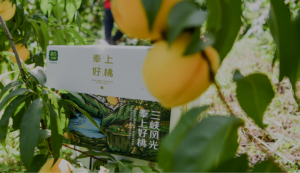Buah -buahan impor kehilangan banding? "Raja Buah" melihat kekayaan menyusut secara dramatis, Perusahaan pergi dengan saja 600 Juta RMB
Meski Performanya Mengesankan, Mengapa stok buah pertama kehilangan kilau?
Dari "Bang Bang" ke "Buah Raja": Kehidupan legendaris "bang bang" adalah salah satu fitur khas chongqing, mengacu pada istilah lokal untuk pekerja dermaga.
Hanya dengan tiang bambu, seikat tali, bahu yang kuat, dan kekuatan fisik, Alat "bang bang" sederhana, dan imbalannya tidak substansial.
Di dalam 1987, 17-Deng Hongjiu yang berusia satu tahun datang ke Chongqing dan bergabung dengan barisan “Tentara Bang Bang.”

Segera, Dia menyadari bahwa menjual buah -buahan dengan membawanya lebih menguntungkan daripada sekadar tenaga kerja manual, Jadi dia memulai bisnis buahnya.
Tak lama setelah itu, Selera Deng yang tajam untuk bisnis melihat peluang: Harga mandarin merah di dermaga Chaotianmen hampir dua kali lipat di kota kelahirannya Changshou. Mengapa tidak membeli jeruk mandarin secara lokal dan menjualnya di Chongqing?
Tanpa ragu-ragu, dia kembali ke Changshou, membeli jeruk mandarin merah, dan membawanya ke Chongqing untuk dijual. Dalam sebulan, dia menghasilkan kekayaan kecil pertamanya 80 RMB.
Untuk menempatkan ini dalam perspektif, di dalam 1987, penghasilan bulanan seorang pekerja biasa adalah sekitar 40-50 RMB. Penghasilan 80 RMB dalam sebulan memberi kepercayaan diri Deng Hongjiu yang berusia 17 tahun untuk menekuni bisnis buah.
Mengarungi arus zaman, Bisnis buah Deng Hongjiu semakin besar. Dengan peningkatan dalam bidang logistik dan teknologi rantai dingin, Deng memimpin timnya untuk secara resmi mendirikan Buah Hongjiu di 2002.

Tiga tahun kemudian, Deng berkelana ke buah-buahan impor kelas atas, yang menghasilkan harga dan keuntungan tinggi, menghasilkan keuntungan yang signifikan.
Pemikiran cepat Deng membawanya pada pertimbangan mengapa ia tidak boleh langsung membeli buah-buahan dari Asia Tenggara dan menjualnya secara grosir ke pasar domestik, sehingga menghilangkan perantara.
Buah Hongjiu berubah lagi, memasuki bisnis grosir buah impor.
Untuk mengurangi kehilangan buah-buahan tropis selama transportasi, Deng memutuskan untuk membeli, proses, dan menjual langsung dari asalnya ke pasar dalam negeri.
Pendekatan ini menjamin kesegaran buah dan mengurangi kerugian, dengan cepat membuka pasar.
Era baru “Raja Buah” memulai perjalanan legendarisnya menuju kekayaan.
Keterlibatan Modal dan Pencatatan di Bursa Efek Hong Kong: Stok Buah Pertama Seiring dengan peningkatan konsumsi domestik, pasar buah-buahan kelas atas meluas, menarik perhatian modal terhadap booming Buah Hongjiu.
Di dalam 2016, Buah Hongjiu berhasil diamankan 50 juta RMB dalam pembiayaan putaran Pra-A.
Kemudian, Buah Hongjiu diterima 178 juta RMB dalam investasi putaran A, 540 juta RMB dalam investasi putaran B, dan totalnya kurang lebih 1.326 miliar RMB dalam pembiayaan seri putaran C, berjumlah sekitar 2.098 miliar RMB total pembiayaan.

Alibaba berinvestasi pada putaran terakhir pembiayaan Buah Hongjiu pada bulan September 23, 2020.
Selain Alibaba, investor di Buah Hongjiu termasuk Tianyi Capital, Modal CMC, Asuransi Sinar Matahari, Modal Ventura Shenzhen, Ibukota Pedagang Cina, Kepemilikan SF, dan Sekuritas CITIC, di antara banyak lainnya.
Hal ini mencerminkan tingginya kepercayaan investor terhadap bisnis Buah Hongjiu.
Menurut prospektus Buah Hongjiu:
• Di dalam 2019, pendapatan perusahaan adalah 2 miliar RMB.
• Di dalam 2020, pendapatan yang dicapai 5.771 miliar RMB.
• Di dalam 2021, itu berkembang menjadi 10.28 miliar RMB.
• Di dalam 2022, itu terus melonjak ke 15.081 miliar RMB.
Dengan peningkatan pendapatan tujuh kali lipat selama empat tahun, Performa impresif tersebut tentu saja menarik perhatian modal.
Setelah beberapa putaran pembiayaan, Buah Hongjiu dipasarkan di Hong Kong pada bulan September 2022, menjadi stok buah pertama. Deng Hongjiu sangat berharga 8.5 miliar HKD.
Memang benar 35 tahun sejak dia memperoleh kekayaan kecil pertamanya 80 RMB.
Alasan Dibalik Anjloknya Harga Saham Sebulan setelah daftar, Harga saham Buah Hongjiu meroket, dengan a 270% meningkat lebih dari sekedar 59 hari perdagangan, mendekatkan nilai pasar 60 miliar HKD.
Namun, sejak masuk 2023, Harga saham Buah Hongjiu terus menurun, hampir kalah 90% pada bulan Oktober tahun ini.
Apa penyebab anjloknya harga saham?
Pertama, dengan menurunnya konsumsi, pasar buah-buahan kelas atas tidak lagi menikmati kejayaannya. Anjloknya harga beberapa buah-buahan dengan harga tinggi berdampak signifikan pada Buah Hongjiu.
Kedua, melambatnya pertumbuhan kinerja perusahaan telah mempengaruhi kepercayaan investor. Meskipun laporan setengah tahun menunjukkan bahwa pendapatan Buah Hongjiu meningkat sebesar 19.4% tahun ke tahun, tingkat pertumbuhan ini tidak buruk, namun hal ini merupakan perlambatan yang signifikan dibandingkan dengan tingkat pertumbuhan tahun-tahun sebelumnya.
Lebih-lebih lagi, Laba perseroan pada semester I tahun ini menurun dibandingkan tahun lalu. Peningkatan pendapatan dengan penurunan laba menimbulkan kekhawatiran terhadap pertumbuhan perusahaan di masa depan.

Yang paling penting, Piutang Buah Hongjiu melebihi 10 miliar RMB menimbulkan ancaman signifikan terhadap operasi perusahaan. Hingga akhir Juni tahun ini, total piutangnya setinggi-tingginya 10.15 miliar RMB, sementara uang tunai di tangan kurang dari 600 juta RMB.
Model jangka panjang perusahaan yaitu “barang diutamakan, pembayaran nanti” secara bertahap mengikis keuntungannya yang menurun. Laporan keuangan menunjukkan hal itu per akhir Juni, penurunan nilai piutang usaha sangat tinggi 716 juta RMB.
Kesulitan dalam mengumpulkan pembayaran kemungkinan akan tetap menjadi masalah jangka panjang bagi Deng Hongjiu.
Di bawah tekanan yang sangat besar, modal telah memilih dengan kakinya, membuat penurunan stok buah pertama tidak mengejutkan.
Bagaimana Raja Buah akan mendapatkan kembali kejayaannya dan bagaimana masa depan Buah Hongjiu masih harus dilihat. Kita hanya bisa menunggu waktu untuk memberikan jawabannya.
Dikutip dari https://www.sohu.com/a/727356535_121686524























